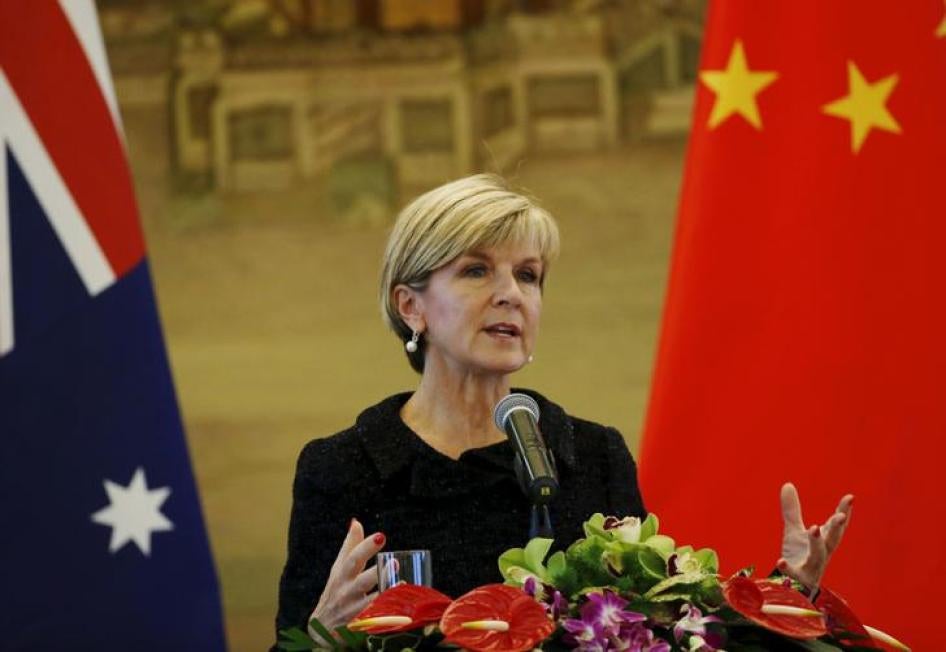Last week, Prime Minister Malcolm Turnbull announced that Julie Bishop will remain as Australia’s foreign minister and that Frances Adamson, an experienced diplomat, will start a five-year stint as the secretary of the Department of Foreign Affairs and Trade (DFAT).
Adamson takes over the department as the world faces tumultuous times. Extremist attacks, long regular occurrences in Kabul and Bagdad, are becoming frequent in Europe too. The European Union is losing a key member, putting European unity to the test. Far-right politicians are gaining ground with populist xenophobic policies. Tens of millions of people are fleeing war, discrimination, oppression and violence.
In such troubled times, many are quick to turn their focus away from human rights protections. But in difficult times, it is even more important that Australia recommits to prioritising human rights in its foreign policy.
Why? Not just because 'it is the right thing to do,' but because Australia’s long term economic and security interests are best served in a neighborhood that respects rights and the rule of law.
Here are five areas that Foreign Minister Bishop and Secretary Adamson should consider to improve human rights in Australia’s foreign policy.
1. Annual reporting on human rights
First, DFAT should issue an annual public report on human rights concerns in specific countries. Countries such as Sweden, the UK, and US already do this. Such reports demonstrate to the governments concerned that Australia is closely monitoring human rights developments, and set a logical and consistent agenda of issues for diplomats and visiting delegations to raise. Public reports are good for transparency and serve to inform the Australian public about human rights concerns abroad. Annual reporting would help produce a more consistent, coherent approach to human rights around the world, train young diplomats about the importance of human rights issues, and send a strong signal to embassies about the value of human rights in diplomacy.
2. Working to end the death penalty in Asia
Second, DFAT should develop a detailed strategy to end the use of the death penalty in Asia. This is in line with recommendations from the parliamentary Joint Standing Committee on Foreign Affairs, Defence and Trade, which called on DFAT to coordinate 'a whole-of-government strategy for the abolition of the death penalty which has as its focus, countries of the Indo-Pacific and the United States of America.' A public report, measuring progress would be a valuable contribution, especially at a time when the death penalty is having a resurgence in the Asia region.
3. Choose our friends carefully
Third, DFAT should introduce a stronger system for vetting foreign officials and security forces of governments receiving Australian security assistance. Those implicated in serious abuses should be denied visits or training in Australia. Foreign relations necessitates exchanges with unsavory individuals, but Australia should be careful not to send the wrong message by rolling out the red carpet and appearing indifferent to the abuses of foreign officials. This year alone, visits by Ethiopian and Cambodian delegations to Australia have included officials with troubling rights records. When meeting officials from countries with poor human rights records, the Australian government should raise their concerns both publicly and privately.
4. Making existing dialogues more effective
Fourth, DFAT should make its regular regional human rights dialogues with China, Laos, and Vietnam more effective by increasing transparency, civil society participation, and setting clear benchmarks for improvements on rights. The impact of these dialogues has already been the subject of a parliamentary inquiry. The current ‘closed door’ discussions could have real benefit if civil society groups in-country and victims of abuses were able to contribute to the discussions and know what was discussed. Visiting Australian delegations should request to visit political prisoners, speak to families of such prisoners, and following the dialogue, issue a detailed public statement outlining issues of concern and what commitments have been agreed to.
5. Sign up to Safe Schools
Fifth, Australia should sign the global Safe Schools Declaration, which urges militaries and armed groups to avoid using schools in the course of military operations and to protect students, teachers and schools from attack. Some 54 countries have joined the declaration to date. Australia has not. As a country that values education for all and prioritises education as part of its development aid to other nations, Australia should commit to signing this declaration.
Will other countries in the region even listen to Australia on human rights, given Australia’s own questionable rights record?
There is no doubt that Australia’s credibility as a human rights leader has been seriously damaged by its treatment of refugees and asylum seekers, especially those who are offshore. More than three years since the Australian government reintroduced this policy, at least 2000 people have been stuck in legal limbo in Manus, Papua New Guinea and on Nauru—hundreds on Nauru still live in moldy tents. More than 800 on Manus remain in a detention centre despite a court ruling that their detention is illegal.
Instead of forcibly moving people offshore, Australia should do its fair share to respect the institution of asylum; while cleaning up its act with respect to asylum seekers arriving by boat. DFAT should work with its Asia-Pacific neighbors for a regional solution that protects the rights of migrants, asylum seekers and refugees: so that people can find safety in transit countries, and are able to earn a living, their children able to attend school, and live free from detention while awaiting resettlement to third countries, including Australia. And offshore processing has to be dismantled once and for all.
In the lead-up to the election, the Turnbull campaign team claimed 'the Turnbull Coalition Government has a strong record of respecting human rights worldwide. This reflects our underlying values and our commitment to promoting and protecting human rights internationally.' Let’s put that commitment to the test.









